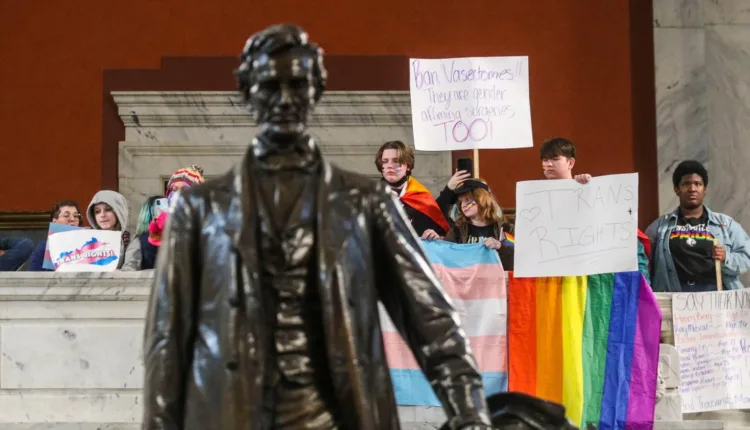
Transgender Healthcare Restrictions Rise in 2024, Adults Increasingly Targeted
TL/DR –
Several US states, led by Republican lawmakers, are proposing a new wave of bills restricting medical care for transgender individuals, both minors and adults. The proposed laws include strengthening restrictions on puberty-blocking drugs and hormone treatments for minors, governing pronouns used in schools, regulating participation in sports teams, bathroom usage, and restricting drag performances and some school curriculums. These actions have sparked concerns amongst transgender youths and their families, who worry about being used as a wedge issue in the upcoming elections.
US Republican Legislatures Propose New Gender-Affirming Care Restrictions
Republican-run state legislatures are once again proposing bills limiting medical care for transgender youth and, in some instances, adults. The move comes after several contentious bills were passed into law last year, resulting in numerous lawsuits. This year, lawmakers in various states want to establish or enhance restrictions on puberty-blocking drugs and hormone treatments for minor-aged patients.
Bills are also under consideration which could control the pronouns children use in schools, which sports teams students can join, and which bathrooms they can use. Further proposals could limit drag performances and certain books within school curriculums. LGBTQ advocates anticipate that restrictions on gender-affirming care are likely to be extended to include adults in the states previously inclined to pass such bans.
Transgender youth and their families fear becoming a political tool as state legislatures face election this year. Emotional stress and exhaustion have been reported among affected families and youth, who feel targeted by these conservative political maneuvers.
Impacts of Restrictive Gender-Based Bills
In Ohio, House Republicans recently voted to override a legislation veto from Republican Gov. Mike DeWine that banned all forms of gender-affirming care for minors. Despite this veto, DeWine initiated a ban on gender-transition surgeries before adulthood and proposed strict rules that critics argue could severely limit access for all patients.
In South Carolina, one of the few Southern states without a ban on gender-affirming care for minors, a House committee has voted to send a ban to the House floor. The proposed legislation also seeks to stop Medicaid from covering these treatments for anyone under age 26.
Resistance from Major Medical Groups
At least 22 states have enacted bans on gender-affirming care for children, though major medical groups including the American Medical Association and the American Academy of Pediatrics have opposed these bans. They maintain that such care, when administered correctly, is safe.
Implications for Future Political Agendas
Several active bills in states like Oklahoma and Missouri propose more robust restrictions for gender-affirming care, sparking concerns among LGBTQ+ advocates. In California, conservatives are attempting to advance a measure that would target the rights of transgender minors, despite the state’s reputation as a refuge for transgender youths and their families from states with medical bans.
Potential Legal Challenges
The American Civil Liberties Union has requested the U.S. Supreme Court to overturn restrictions for youth in Kentucky and Tennessee. The full 8th U.S. Circuit Court of Appeals is currently reviewing a request from Arkansas to reverse a ruling that struck down the state’s first-in-the-nation ban on gender-affirming care for youths. Federal rulings against bans thus far have been issued by judges appointed by both Democratic and Republican presidents.
—
Read More Health & Wellness News ; US News
